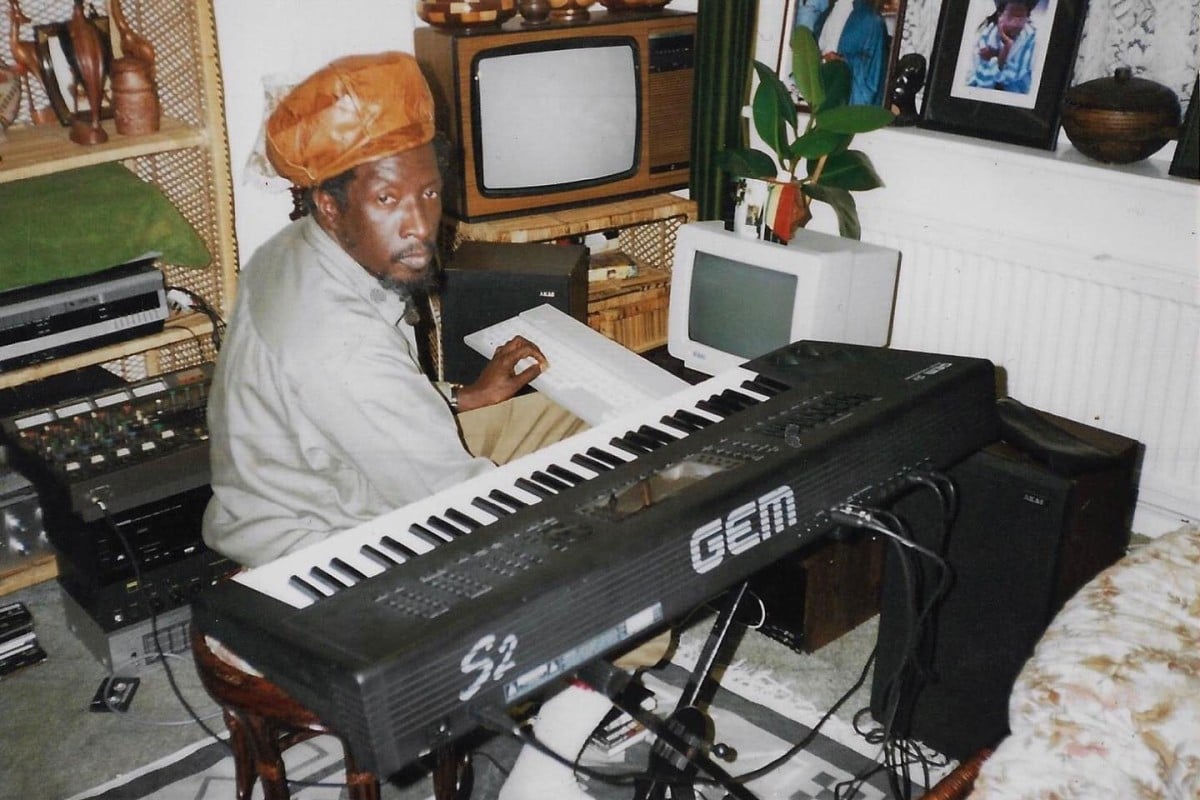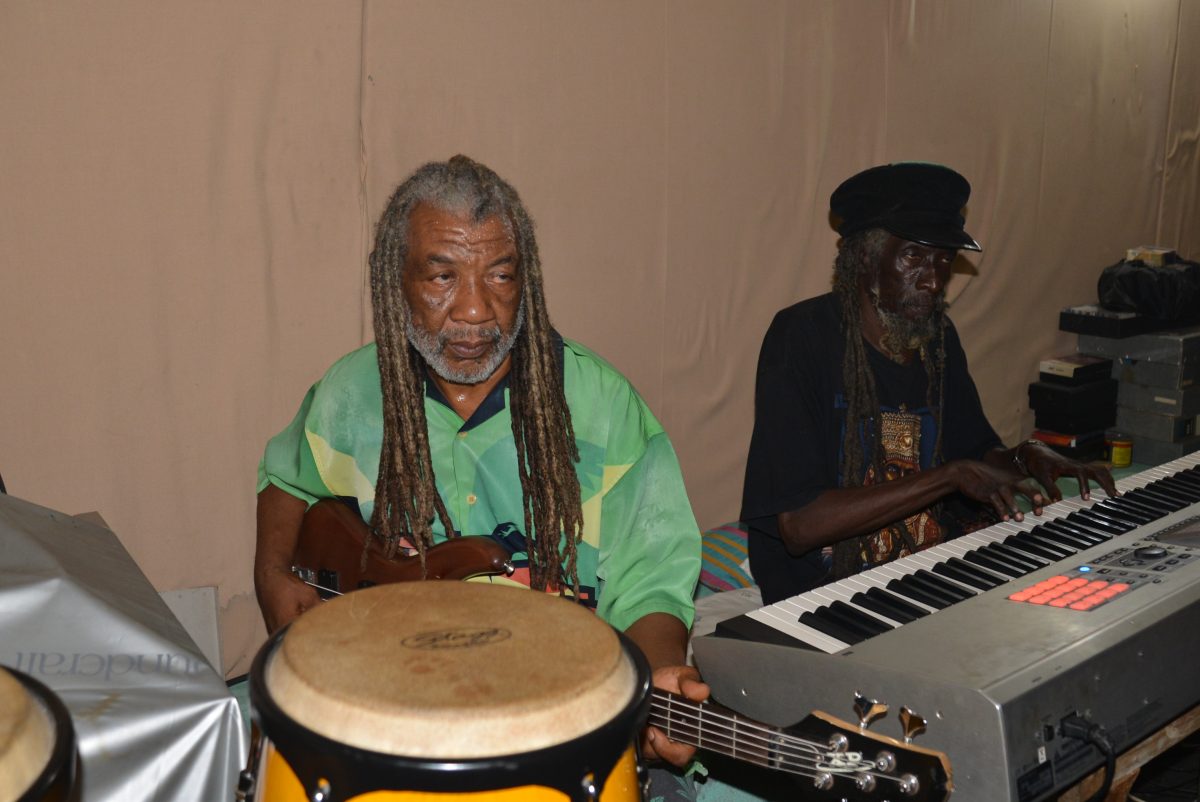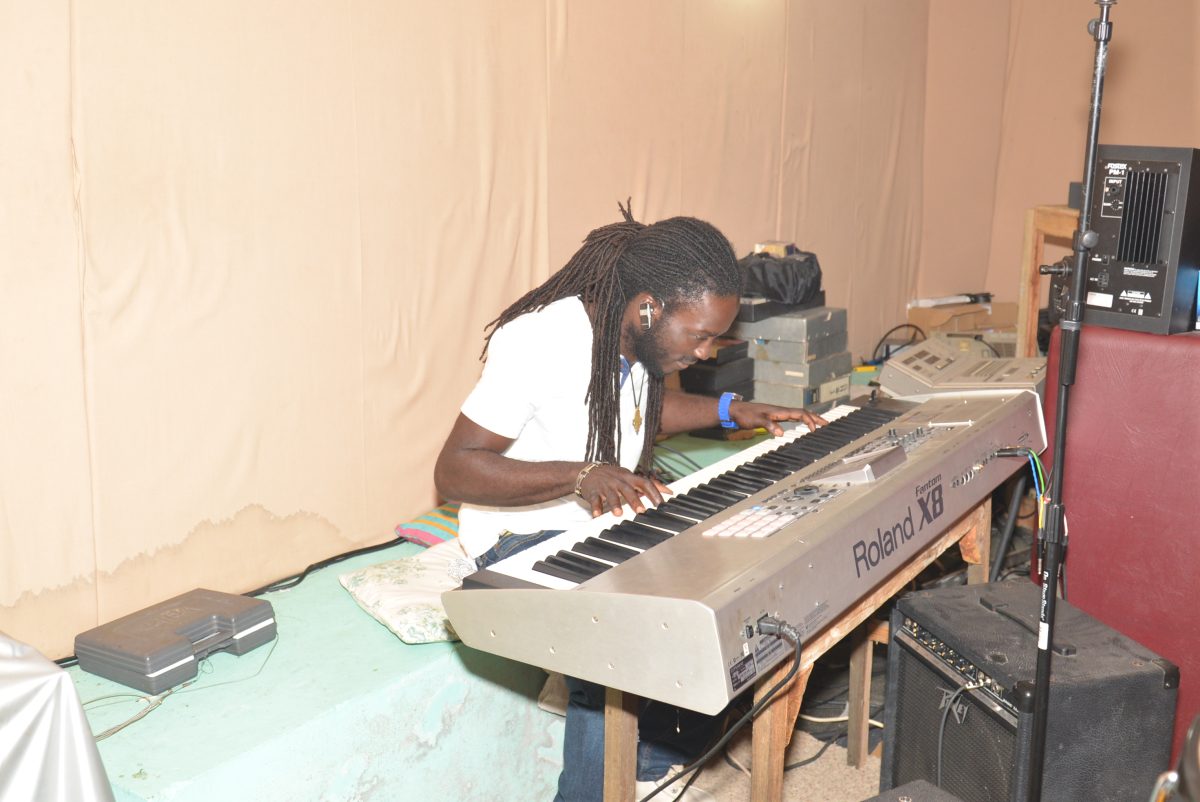Iauwata’s Mastery: How A Guyanese Legend Shaped Nyahbingi Reggae Singer Raphi Chambers’ Musical Path

Guyanese music professor, multi-instrumentalist, and composer Iauwata Amha Selassie, played a defining role in the official rise of Jamaican Nyahbinghi Reggae singer and producer Raphiel “Raphi” Chambers and his band, Rock Top—an influence Raphi continues to cherish to this day.
Raphi’s quest to solidify his band began in February 2013, when he sought guidance from the legendary Iauwata—a long-time friend of his late father, Bongo Jack.
Iauwata’s reputation as a master musician who could play more than 27 instruments was well known. A devoted Rastafarian and a towering figure in the reggae scene, Iauwata worked with artists such as Ike and Tina Turner, Sly and Robbie, Bunny Wailer, and Luciano.
Just two weeks after meeting at a Nyahbinghi event in Jamaica, Iauwata enabled Raphi to master the bass guitar and, shortly thereafter, helped the then 22-year-old’s siblings hone their musical talents, guiding them to complete their debut album, I Feel Like I Wanna Go Home, within the same brief period.
“Iauwata was a friend of my father Bongo Jack. Suh me hear seh Iauwata deh a Jamaica. Mi always hear of Iauwata, suh mi decide seh mi waan meet wid Iauwata because him play like 27 different instruments. Think about it, me play like five instruments and him play 27; who wouldn’t waan meet him, an me love music so much?” Raphi recounted to DancehallMag.

When Raphi approached Iauwata, the elder challenged him to prove his dedication by purchasing his own instruments. Raphi said he responded immediately, buying a keyboard and beginning lessons under Iauwata’s tutelage.
“Suh him tell mi seh him can teach mi fi play di instrument dem, but it would be best if I learnt how to play the keyboard first, as it has all the keys and melodies,” he added.
“Him seh to mi seh ‘well if you are serious, you would have to buy a keyboard’. So I went and bought a Yahama keyboard fi about $17,500 dem time deh in 2013. And then he started teaching me to hold some chords and basics,” the Seek singer added.
Raphi said his commitment quickly deepened, leading him to acquire a bass guitar and drums as he prepared to elevate his craft after visiting the Taylor studio at Great River in St James, which had an impressive array of musical instruments.
“So when I saw those instruments I decided I wanted instruments like those for myself. So he (Iauwata) said ‘if you are serious and want to buy all of them, buy them. I will teach you how to play them’. I wanted to play the bass guitar,” he explained, noting that he went to Kingston bought the drum set, guitar, amplifier and other accoutrements.
That night, after returning to Hanover, Raphi converted his sister Sarah’s room into a studio, and by dawn, Iauwata began his guitar training.
“The first bassline he gave me to do was the Kutchie. First he wrote out the fret. I still have that paper where he wrote out the guitar fret. I am going to frame it,” Raphi said.
The St. James native told Dancehall Mag that Iauwata’s mentorship elevated his musical skills within two weeks of intensive training, with constant encouragement that kept him motivated.
“Suh everyday now, mi naw focus pan nuttn else. The second morning he list out five basslines. When Iauwata teach mi how fi play dat deh bass line deh, mi surprised fi si how him just tell mi easy and how him just show mi easy. Like him just call out di chords dem…,” he reminisced.
By the end of the second morning, Raphi said he had mastered a total of five bass lines.
“Iauwata just go up and said ‘Papi, give me the Kutchie, Give me the Promised Land, Give me the Answer’. Then he gave me a high five and said he taught a lot of people but I was the first one who caught on so fast. He said music was within me,” Raphi explained.
Rock Top, with Raphi as the lead vocalist, performed their first live show two weeks later at Jarret Park in Montego Bay alongside Iauwata, during the Nyahbinghi opening segment at during the Black Friday Commemoration of the 1963 Coral Gardens Riot. That event also saw performances from Chronixx and Queen Ifrica.
The Rastafarian audience’s overwhelming response, with tears of joy and applause, signaled the official beginning of Raphi’s promising musical career.
Weeks leading up to that event though, when Iauwata had informed Raphi that he wanted him to play the bass guitar during their performance, the Nutn Soft singer said he had protested profusely, telling the professor that he was a novice and was not ready for the big stage.
However, Iauwata assured him he would be fully prepared in two weeks. During that time, the Georgetown native trained him from morning until after midnight, with breaks only for meals or a spliff.
“I was worried, thinking how would I remember so many songs, but Iauwata said not to worry so I believed. But I still wondered how Iauwata had so much confidence in me when there were were numerous professional, experienced bass players to choose from,” he explained.
SHOW DAY
“On the day of the show, I still felt that I wasn’t ready, but the icon seh mi ready. Mi a seh ‘a wonder if him know wha him a do, caw mi nuh ready enuh. Mi not even memba wha fi play’. Yuh si when time mi touch dat stage and dem (emcee) seh’Rock Top’, mi have di guitar suh, inna mi hand and mi nuh memba wha mi fi play. When mi look dung pan di fret board, mi nuh know weh G deh, from weh A deh. Mi nuh memba nuttn. Mi suh nervous mi not even rememba weh mi a do,” he recalled.
Raphi recounted that, fortunately, Iauwata began a long five-minute prayer, during which his stage fright gradually faded. As fate would have it, he remembered the encouraging words his Guyanese mentor had repeated during their training sessions.
“Mi only hear when di man seh ‘Papi, you can do it. Trust mi, you can do it’. And when mi look back dung suh pon di guitar again, everyting just come back, and mi rememba seh mi a guh start from E-Flat. And mi start memba di bassline. When him look round pan mi and seh ‘one, two, three’, yuh waan si when Raphi gone inna di bass an a play. Everyting just come back. Mi start cry,” he recalled.
Not long after that historic feat, Iauwata guided Raphi’s siblings—Itangi on guitar, Sarah and his other sisters on backing vocals, and their younger brother, Icassa, who was just 15 at the time—through the process of creating their debut album.
The family band, under the guidance and tutelage of Iauwata, wrote, arranged, and recorded I Feel Like I Wanna Go Home, an impressive 13-track album, in just two weeks. The album’s production, mixing, and mastering were completed within another two weeks, and the finished product was officially launched on March 29, 2014, at the Mandela Green Entertainment Centre in Hanover.
Reflecting on the experience, Raphi says he remains humbled by the accomplishment. The album, which includes standout tracks like Dem Dont Want Fi See Man Rise, Mama, Hail Rastafari, and the title track Feel Like I Wanna Go Home, has enjoyed a steady reception over the past decade.
Raphi, who has performed on Rebel Salute, Reggae Sumfest and the Welcome To Jamrock Reggae Cruise, credits Iauwata’s mentorship for helping him to reach his full potential. He noted that Iauwata’s patience was remarkable, as the music professor never rushed him, instead always remaining calm and supportive.
“Even when nuff a wi get ignorant inna di band, him always say ‘dont worry, calm down man. Say no to the devil, chase that boy away man’. So how he taught me inspired me to teach others to make them comfortable,” he said.
“Since Iauwata nuh deh yah, mi miss him. I hardly take up the bass guitar nowadays from Iauwata nuh deh yah,” he mused.
Iauwata, who passed away in 2017, is remembered as a Rastafari musical icon and global citizen. His influence stretched far beyond Reggae music as he mentored countless artistes and left a lasting legacy. His deep spiritual connection to music and tireless dedication to those who sought his guidance have cemented his place as one of the most revered figures in Nyahbinghi Reggae and music in general.

